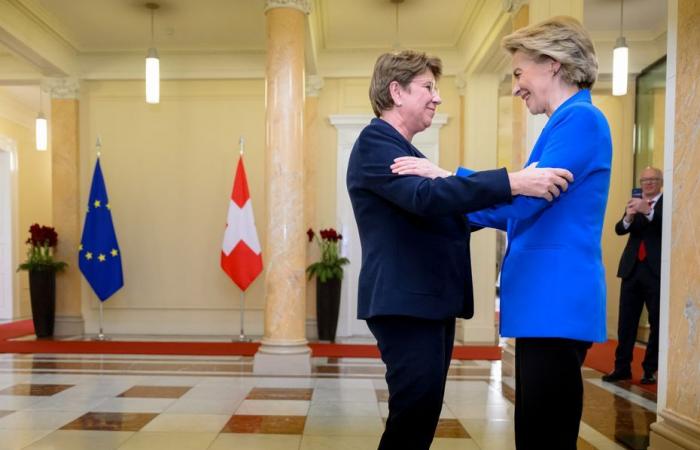
After several years of negotiations, December 20, 2024 marks a decisive step in the draft agreement between Switzerland and the European Union. The government of Bern validated the text in the presence of Ursula Van der Leyen, the president of the European Commission.
The essentials of the day: our exclusive selection
Every day, our editorial team reserves the best regional news for you. A selection just for you, to stay in touch with your regions.
France Télévisions uses your email address to send you the newsletter “The essentials of the day: our exclusive selection”. You can unsubscribe at any time via the link at the bottom of this newsletter. Our privacy policy
Switzerland is still not a member of the European Union, but it is getting closer. Our Alpine neighbor should in any case soon benefit from easier access to the European internal market.
This is the meaning of a framework agreement negotiated for several years between Bern and Brussels. Interrupted in 2021, negotiations resumed in March 2024 and the conclusion was made official before the end-of-year holidays.
The federal council gave the green light this Friday, December 20. The President of the European Commission Ursula Von der Leyen even made the trip to Switzerland to seal the agreement with the President of the Confederation Viola Amherd.
This agreement between the European Union and Switzerland is historic. In this challenging environment, where global power relations are constantly shifting, strong partnerships like ours are not just an advantage. They are a must. → europa.eu/!mtPwfR
[image or embed]
— Ursula von der Leyen (@vonderleyen.ec.europa.eu) December 20, 2024 at 3:14 p.m.
The outcome of the negotiations is good and beneficial for both partners.
Viola AmherdPresident of the Swiss Confederation
Until now, relations between Switzerland and its European neighbor were governed by 120 different texts, dated and often obsolete.
The agreement negotiated at the end of 2024, sometimes directly between the Swiss Minister of Foreign Affairs Ignazio Cassis and European Commissioner Maros Sefcovic, aims to frame future bilateral relations. The negotiations are “touching tip”confirmed the RTS a few days ago.
The final sticking point unsurprisingly concerned money, and more precisely Switzerland's contribution to the cohesion fund, which helps reduce economic disparities between EU countries. Finally, Bern will contribute 350 million Swiss francs annually from 2030.
This agreement establishes common rules which should facilitate the daily lives of citizens and businesses on both sides of the border.
“Everyone made an effort, there are reciprocal concessionsexplains Christophe Grudler, MoDem-Renew MEP and permanent rapporteur of the European Parliament for relations with Switzerland. It is our common interest, which leads to a global agreement.”
On RTS, the Geneva national advisor of the Center and vice-president of the party Vincent Maitre recognized this Friday that Switzerland must have felt “extremely privileged”with “extremely important concessions” of the EU, “which no other member country has obtained”.
If Swiss companies will have privileged access to the common market, the converse is true. Instead of the 28 day deadline currently in force, French construction companies will soon only be able to declare a construction site in Switzerland 4 days before the start of work. “This will open up fairly significant markets for Franche-Comté companies.hopes Christophe Grudler, because they are cheaper than the Swiss.”
Switzerland had no problem living without Europe in the short term, but in the medium and long term? We have a common future.
Christophe GrudlerMEP MoDem-Renew
On the free movement of people, the founding principle of the European Union, Switzerland wanted to obtain a safeguard clause, to limit European immigration. Brussels gave in. Switzerland will even be able to continue to expel delinquent foreigners to their European country of origin.
Conversely, Europe has imposed its views on access to social assistance: “aAfter 5 years of residence in Switzerland, a European will be entitled to the same assistance as a Swiss”specifies the MEP from Belfort. As for cross-border workers, they will be better protected. The agreement provides that no jobs can be reserved for Swiss people and that foreigners must be paid the same price as Swiss workers.
The agreement also includes Switzerland's access to the European electricity market, which will allow it to secure its energy supplies, and its return to the Horizon Europe research program.
Once validated by the Swiss Federal Council, the agreement must be ratified at European level by a vote of the Council, then of the Parliament in Strasbourg.
On the Swiss side, Parliament will also have to decide, but also the people via referendum. There should also be several votes on the subject, since the government in Bern wishes to divide the agreement into four thematic packages.
We hope that Switzerland will be ready to move forward. We believe we have achieved a very delicate balance, which should be appreciated as such by all parties
A European diplomatic source in Brussels, to AFP
Opposition to this rapprochement between Switzerland and neighboring countries remains strong, from both unions and certain political parties. The Swiss Trade Union Union is concerned about the level of wages and the sustainability of Swiss public services, whether rail transport or electricity.
The radical right party UDC criticizes for its part “the same pack of lies as in 2021” and speaks of a “treaty of submission to the EU”.





